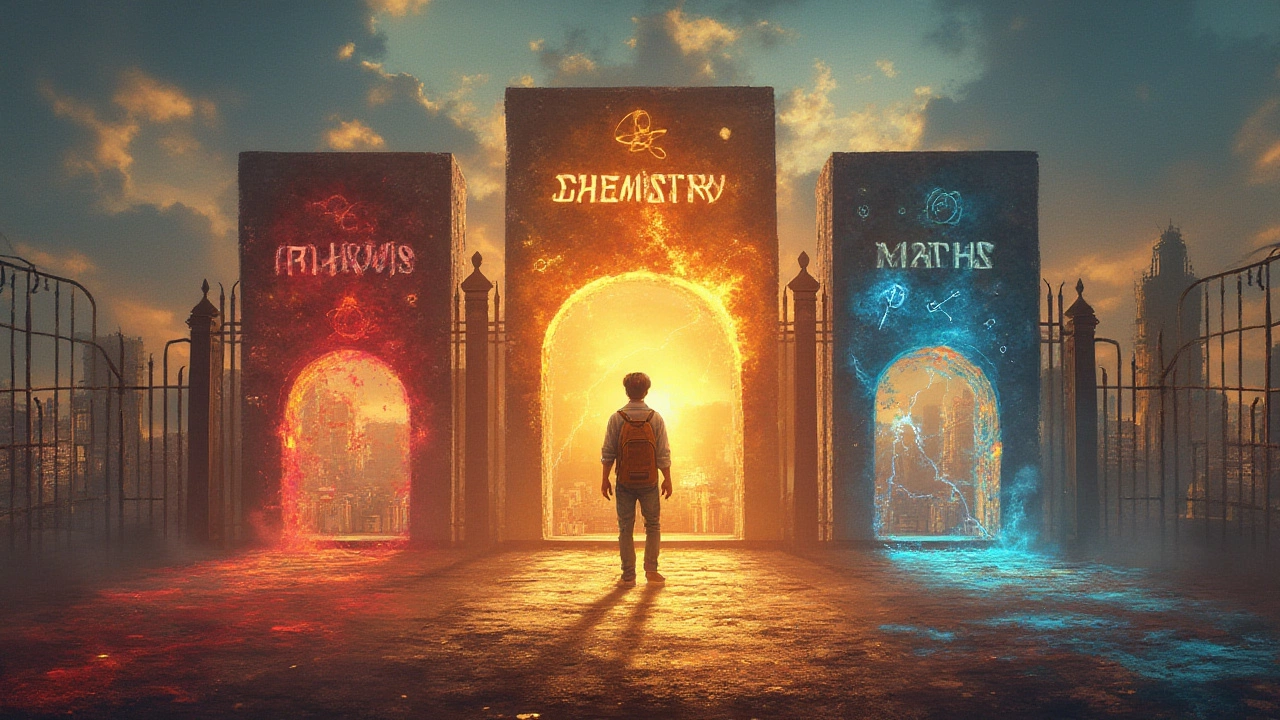Every year, lakhs of students chase the dream of cracking the Joint Entrance Examination (JEE), but there’s one question that always pops up in coaching centers and school corridors: which is the easiest subject in JEE? Talk to ten different candidates, and you’ll get ten different answers, each convinced about their choice. Chemistry? Physics? Maths? Or is it just a trick question?
It’s really not about a clear-cut answer—you won’t find any official ranking where IITs put up a board saying, “Hey, Chemistry is a freebie!” But walk into any coaching center, and chances are the hallway whispers put Chemistry right up there as the lightest load. Is it really that simple, though? Trust me, I’ve lived through JEE with my own sibling—lost count of the arguments we had debating which was the easiest or hardest. I’ll break down everything, pulling in real data, some surprising stats, what toppers actually say, and the sort of tips I wish someone had handed out when we were frantically solving three lakh MCQs.
How Easiness Varies: Is Chemistry Always the Favorite?
If you listen to JEE aspirants, Chemistry often wins as the “easiest” subject. Why is that? For starters, Chemistry has a big chunk of theory—you memorize reactions, trends, formulas. Unlike the endless calculations of Physics or the late-night muddles with Maths integrations, Chemistry gives you space for direct fact-based questions. That opens doors for scoring marks even if you aren’t a ‘maths brain’ or a fan of physics experiments gone wrong.
Take the numbers: According to the official JEE Advanced 2024 statistics, the average scores in Chemistry were the highest compared to Physics and Maths. In fact, many students scored better in Chemistry—by almost 10-12%—across both JEE Main and Advanced years. But don’t just stop at stats. The format of Chemistry questions heavily tilts towards NCERT textbooks, so students who really chew through NCERTs almost always find Chemistry more approachable. No stubborn derivations, no wild card conceptual jumps—just clear correlations and memory power.
Now, that doesn’t mean Chemistry is a cakewalk for everyone. If you’re not the type to memorize trends and details or if you blank out on factual recall, Chemistry can turn into a nightmare. On the flip side, some students love the logic of Maths or the problem-solving in Physics—those equations keep them awake better than three cups of coffee! For them, Chemistry feels like an endless memory quiz. But if you asked 100 JEE aspirants, over 65 would pick Chemistry as being “the subject you can rely on for boosting your score quickly.”
Check out the kind of score averages we saw for JEE (Main) 2024:
| Subject | Average Score (2024 Main) | Topper’s Score |
|---|---|---|
| Physics | 57 | 100 |
| Chemistry | 68 | 100 |
| Maths | 54 | 100 |
One thing that really stuck out: several coaching experts claim that students who finish the “Inorganic Chemistry” sections from the NCERT often crack about 75% of their Chemistry paper with little risk. It’s not a guarantee—but if you’re on a time crunch (who isn’t, with boards, entrance, and whatnot?), it’s the closest thing to a cheat code that JEE offers.
I remember my friend Sara, not really a Maths fan, who “secured” her rank by maximizing out Chemistry. She focused deeply on periodic table trends and organic reactions, skipped the “extra” reading, and it pretty much carried her to NIT. That’s not luck. That’s playing to your strengths.

Digging Deeper: Why Do Some Students Find Maths or Physics Easier?
Chemistry may get the “easiest” badge in group chats, but you’ll meet Maths lovers who breeze through calculus and coordinate geometry, almost on autopilot. Maths, if you’ve spent time practicing, can give you 100% accuracy—either you have the answer, or you don’t. Unlike Chemistry, where a small mistake in recall means total loss, in Maths, logic prevails. Some say it feels like solving a fun puzzle—once you’re in the zone, the patterns show up everywhere. There’s even a joke among toppers: “JEE Maths is hard only until you finish the previous 10-year papers!”
Now, if you’re eyeing Physics, things get a little tricky. It’s the bridge between memory and logic. Physics is all about connecting formulas with real-life concepts. But if you “click” with the concepts and have a sharp calculation speed, Physics can also become your high-scorer. My cousin would say, “Physics questions are just stories—you connect the right equations, and you’re done.”
Here’s something only a few students realize—JEE sets the Physics section in a way that questions usually mix two or three small concepts together. If you can identify those patterns, Physics becomes way more scoring than most students think. There’s also another quirk: In 2024, more students scored above 90 marks in Physics (at Advanced level) compared to Maths, thanks mostly to direct formula-based mechanics questions which were common that year.
But Maths and Physics have a catch—if you skip even one chapter, you’ll probably lose a bunch of questions since JEE rarely leaves any topic untouched. It’s as if they want to check that you haven’t just cherrypicked your way through the syllabus! A look at last year's topper data backs this. Students who scored 95+ percentile in JEE (Main) said they spent 50% more practice time on Maths and Physics compared to Chemistry, mainly due to the huge range of topics and the need for daily practice drills. If you have a knack for solving, love patterns, and aren’t afraid of calculations, Maths or Physics might feel easier—just don’t expect an NCERT shortcut.
Which reminds me of Ethan, who always swore by his two rules: “Never leave any chapter in Maths, and Physics must be revised with a cheat sheet of all formulas.” He’s a believer in hard grind rather than memory tricks—maybe that’s why we have such different approaches!

Smart Strategies: How Should You Decide Which JEE Subject Is Easiest?
If you’re searching for the easiest way to boost your JEE score, first own your learning style. Are you the type who feels at home memorizing reactions and trends? Then Chemistry, especially the Inorganic and Organic blocks, is your ticket. But if you need logic, crave puzzles, and maybe enjoy a little number crunching (you probably like sudoku!), Maths and Physics could end up feeling less like work and more like fun.
The key is to treat each subject on its terms, not what forum rumors say. Here’s how toppers fine-tune their prep:
- For Chemistry: Master NCERTs—not just reading, but true recall. Make concise flashcards, especially for reactions and periodic trends. Focus hard on mock tests, since JEE usually styles questions in a “twisted direct” manner.
- For Physics: Build a master sheet of formulas, then attack previous year problems. Most toppers do “concept mapping”—they write down key links between chapters, like how rotation links to gravitation, so they don’t freeze on mixed-concept questions.
- For Maths: Lots of revision—solve different question patterns from each topic. Don’t just memorize solutions; try twisted versions. Practice is the oxygen for JEE Maths. Mix up your question banks—don’t get lazy thinking calculus on JEE will be as direct as in boards.
Here’s one more fact for future aspirants—almost 80% of top-500 JEE rankers in the last three years said in surveys that they boosted their confidence by focusing on their “strongest” subject during the last month—not on the one they “should” have mastered. They played to strengths instead of giving in to peer pressure.
If you want some hacks that always work, try this:
- Regularly take time-bound mock tests (past 5 years’ papers first, then new mocks).
- After every mock, reattempt all mistakes—don’t blindly read solutions. Do, then review, then repeat.
- Make “error notebooks” where you paste silly mistakes, forgotten formulas or concepts you blank out on. Revise these every weekend.
- In Chemistry, learn through group quizzes – you’ll recall it better if you play ‘Who Wants to be a Millionaire’ with your study group.
- Maths: Use shortcut techniques, but check them on hard questions so you don’t rely on memory alone.
The best thing you can do is ditch myths. The “easiest” subject in JEE is the one you build the strongest relationship with. There’s no shortcut, no legend, and certainly no single subject that’s universally easy for everyone.
So, Chemistry often gets the top spot for being the most approachable, at least statistically. But the badge only sticks if that’s where you shine—if you can recall trends, handle MCQs with direct answers, and lean into theory-heavy content. If you’re more at home with logic and calculations, don’t shy away from doubling down on Maths and Physics. The right choice is the one that fits your brain, your prep style, and the way you like to work under pressure. Choose wisely—your future self will thank you.
